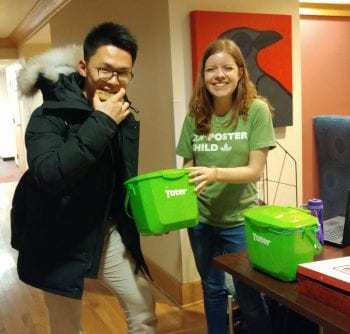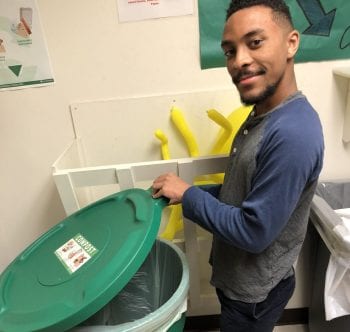This article was written by Mackenzie Hines-Wilson, Communication Associate at the Office of Sustainability and resident of Dardick where the composting pilot took place.
According to the EPA, about 38 million tons of food is wasted every year, of which only 5% is composted. The WashU Green Ambassador (WUGA) Waste Team, a peer-to-peer education program designed to spread sustainability culture among first year students, decided to start addressing the issue by piloting a composting program for students living on the South 40 (learn more about the initial steps and funding of the project here).
Cara Cook, member of the WUGA Waste team, explains that the WUGA teams have been responsible for developing projects that further sustainability through student engagement and education. “When we started thinking about a potential project, compost expansion immediately came to mind. A lot of students wonder why there aren’t more compost options outside of the dining halls, and a lot of us throw out food in our dorms.”
A Pilot to Try Out an Old Idea
The pilot program, which ran over a two-month period ending May 1st, consisted in the distribution of small green plastic bins to the residents of Dardick, one of the Way Crow Residential College’ buildings. Once full, the bright green bins had to be emptied in the bigger compost tote installed in each floor’s trash room.
16 residents voluntarily signed-up to receive a tote, committing to compost their food waste when in the dorms. As most of them represented a four-person suite, the program ended up impacting over 50 Dardick residents, and it could have been even bigger. Cara explains, “I think the best, but also the worst thing so far has been that a lot of people expressed interest in the program after it started. We unfortunately didn’t have enough totes to serve  everyone, but it’s really exciting that so many students were willing to get involved.”
everyone, but it’s really exciting that so many students were willing to get involved.”
Impacts and Lessons Learned
Sharing their experience with the program, some participants have confessed that they felt encouraged to be more sustainable in their everyday lives. First-year student Annie Zhou found that the program gave her a simple and easy way to help the environment, as she did not have much background knowledge on waste diversion before she decided to participate.
“I’ve always wanted to help out the environment, but I wasn’t sure how. Through the program, I was really made more aware about what was compostable, so I could divert waste. Now, instead of throwing all my food items in the trash, like I normally would, I realized I can compost them,” Zhou said. “I really felt like I was making a difference”.
One of the challenges – and sign of the program’s necessity – was that the distributed bins weren’t big enough to hold all of the waste students were trying to compost, especially considering there could be up to four students trying to contain their waste in one container. In addition, the totes themselves were also flimsy, and a few cracked before being distributed.
A Waste Audit to Measure Diversion Rate
Towards the end of the pilot period, the WUGA waste team conducted a waste audit in Dardick intending to evaluate the outcomes of the program in terms of diversion rate. The information collected shows that about one third of the compostable waste has been properly disposed (which is still way above the national average), the other two thirds having been placed either into landfill or recycling bins. However, while nearly half of the recycling was contaminated with either landfill or compostable waste, only 3% of the compost was contaminated.
The main takeaway of this audit is that, in addition to increasing the composting capacity, there is a need to develop education about the sorting process and what can and cannot be composted.
From a Pilot to a Permanent Program
After this successful pilot, the WUGA team will be seeking support from Residential Life to expand composting to more Residential Halls. To make the case, the team will gather numbers about participation, volume, contamination, and costs.
Cara is hopeful that the results of the pilot show evidence that this is a great opportunity to explore. “The best possible outcome would be that Residential Life decides that the program is a worthwhile investment for the university, and that they take on more ownership for the program. Planning has begun to expand the pilot starting fall 2018 with student oversight coming from WUGAs.” If the program is approved for funding, students could expect to have the option to compost in their dorms by the start of the fall 2020!